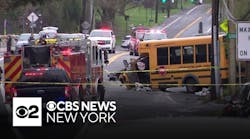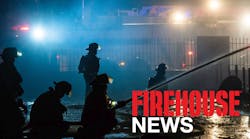The past month has seen a lot of activity, but not much progress in what has become a major effort to persuade the Department of Justice (DOJ) to implement the Hometown Heroes Act as Congress intended it to be. There have been meetings on Capitol Hill, a flood of e-mails, conference calls, a misleading press release, and more joint letters from Senate and House members to the President and the Attorney General — followed by explanations from DOJ officials that at times are almost incomprehensible. And, these are only skirmishes before the main battle.
The fact that there has to be a battle is sad and disappointing. It shouldn't be this way. As we explained in last month's column, it has been 3½ years since President Bush signed the Hometown Heroes Act. That made the survivors of firefighters and police officers eligible to receive the federal government's Public Safety Officers Benefit (PSOB) if the death was caused by a heart attack or stroke brought on by an emergency response or a training exercise. Until then, only the families of firefighters who died from traumatic injuries were eligible for the $295,000 federal payment, even though more than half of all firefighter line-of-duty deaths are attributed to cardiovascular disease.
The updated count as of June 15 shows that 264 line-of-duty-death claims have been filed under the Hometown Heroes Act since early 2004. Of that number, only six have been approved, 47 were denied and 211 are "in review" waiting to be decided. That is an incredibly slow performance by any standard and an implausible rejection rate of almost 90%!
What makes it even more puzzling is that over a period of many years, DOJ's Office of Justice Programs has been efficient, fair and compassionate in processing PSOB claims. Each year, some are rejected because they do not meet the criteria for line-of-duty deaths. But the decision usually comes within a reasonable amount of time and a majority of the claims are properly investigated, verified and approved without prolonged delays. In contrast, when it came to implementing the Hometown Heroes Act, the officials in charge of those cases moved at a snail's pace, tied up the process in red tape and seem to go out of their way to find reasons to reject applications. One DOJ official has been heard to blame part of the problem on "grossly overweight volunteer firemen who smoke cigarettes."
Many members of Congress are furious because they drafted the law to make it easier for eligible survivors to file legitimate claims. Last month, 95 Senate and House members sent a joint letter to President Bush calling on the administration to expedite clearing up the backlog of claims and start awarding benefits as Congress intended. Some members also wrote personal letters on behalf of claimants from their states and a similar joint letter went to Attorney General Alberto R. Gonzales, who has been under fire on a whole series of issues. Republicans as well as Democrats have been critical of Gonzales and called for his resignation.
The President has publicly defended Gonzales against his critics and, as this is written, he still is the Attorney General. With all of the controversies swirling around Gonzales, the fire-police benefit problem has attracted only limited media attention. But we've heard from several sources that the White House is unhappy over the way in which the Hometown Heroes Act has been handled. It's another embarrassment the Justice Department doesn't need and they want it straightened out — fast. In response to a congressman's letter, a senior DOJ official promised that "continued refinement of the claim and review process" will result in "a more expedited review."
Senator Charles E. Schumer (D-NY) is among those who wrote to Justice on behalf of the families of two fallen firefighters from his state whose PSOB claims had been rejected. His office issued a surprise press release proclaiming that there had been a "breakthrough," that "standards and rules have been changed" and responding to a fire would no longer be considered a "routine" activity. Schumer said the statement he received from DOJ was "unequivocal." Maybe so, but a Justice Department spokesperson said that Schumer's information was based on a "miscommunication" and that "no policy has been changed." (The senator's office did not return my call to check it out.)
It may be that DOJ has stopped quibbling over whether a firefighter's heart attack was caused by "routine" or "non-routine" stress — but you can't be sure. Everyone agrees that there have to be strict standards to determine what constitutes a line-of-duty death. But the rules have to be reasonable and must not place an unfair burden of proof on families who are entitled to receive the federal death-benefit payment. Even though the Hometown Heroes Act was a new phase of the PSOB program, there is no excuse for taking 3½ years to set it up and process only 53 out of 264 claims. And, it is inconceivable that only six have qualified as line-of-duty deaths.
There may not have been any policy changes in last month's skirmishing, but Congress and the fire-rescue service are determined that big changes will come out of the battle that lies ahead. Only the White House has the power to make it happen without a battle.
HAL BRUNO, a Firehouse® contributing editor, retired as political director for ABC News in Washington and served almost 40 years as a volunteer firefighter. He is a director of the Chevy Chase, MD, Fire Department and chairman of the National Fallen Firefighters Foundation.





